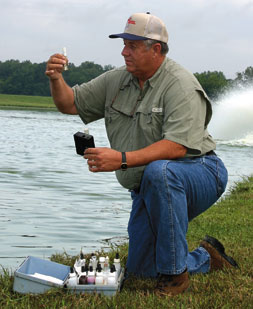Catfish Producers Help Improve Water Quality

How a farmer cares and prepares soil for planting has a tremendous impact on the outcome of his crop. Those same principles apply for more than 28,000 acres of water on Alabama farms that produce some of the world’s best tasting farm-raised catfish.The Alabama Catfish Producers, a division of the Alabama Farmers Federation, was among the first groups in the U.S. to recognize the importance of water quality. The group believed water quality would not only help increase production, but also would help the environment and secure the industry for years to come.The group knew federal guidelines were going to be developed that would set new regulations for effluents from aquaculture farms. Those could subject catfish farms in all states to permitting under the Clean Water Act. Alabama farmers decided to be proactive and contracted with Auburn University in 1997 to make an environmental assessment of catfish farming in the state.Additionally, in 1999 producers funded a study resulting in the creation of a technical manual entitled “Best Management Practices for Channel Catfish Farming in Alabama.” Results of that study were released in March 2003. It shows pollution of natural waters by catfish farming can be prevented or minimized through application of reasonable practices to reduce the volume and improve the quality of effluents. As part of the study, researchers conducted an environmental audit of selected catfish farms in 1999 to determine the practicality of installing Best Management Practices (BMPs). In addition to proving that many of the BMPs for catfish farming represent the most efficient production methods, it showed BMPs may actually reduce production costs in the long run.Alabama Catfish Producers Chairman Butch Wilson has 430 acres of water in catfish production on his farm in Dallas County. He’s the fifth generation on the family farm, and his daughter and son-in-law, Dea and Williard Powe, as well as his son and daughter-in-law, Travis and Keisha Wilson, also work on the farm.Wilson said he’s proud to be associated with an industry that is dedicated to preserving the environment and offering new opportunities that allow his children to stay on the farm. “Traditionally, this was a beef cattle operation,” Wilson said of his farm located near the small town of Brown. “In the early 1970s and 1980s we switched to row crops. Since then, catfish has given us the opportunity to convert to a more profitable business and allowed us to continue to farm.”Jimmy Carlisle, director of the Federation’s Catfish Division, said even though the study funded by producers proved Alabama farmers are doing a good job of protecting the environment, the Alabama Department of Environmental Management suggested water quality monitoring in catfish-producing areas continue for a few years. That research will help verify catfish farm effluents are not degrading surface water quality, he said.In response to ADEM’s request, the Alabama Catfish Producers funded a three-year study that began in January of this year and will continue until January 2006. The study will monitor Big Prairie Creek and its tributaries to verify catfish farming effluents are not harming surface water quality and that voluntary BMP programs will be adequate regulations. The study also is expected to show Alabama catfish producers have voluntarily exceeded the minimum requirements of demonstrating environmental stewardship set by the Environmental Protection Agency.”Alabama Catfish Producers were instrumental in providing leadership throughout the Southeast regarding water quality management,” Carlisle said. “That leadership says a lot about the farmers in our state and the stewardship they apply to their farms.”In Alabama, we’re fortunate to have the water resources, climate, soil type, infrastructure and labor necessary for the catfish industry to grow. Combining all those ingredients with the fact that catfish is delicious and healthy, and the future is very bright.”EDITOR’S NOTE: Copies of the “Best Management Practices for Channel Catfish Farming in Alabama” may be obtained from the Alabama Catfish Producers. Contact Jimmy Carlisle at 1-800-392-5705, ext. 4214.
